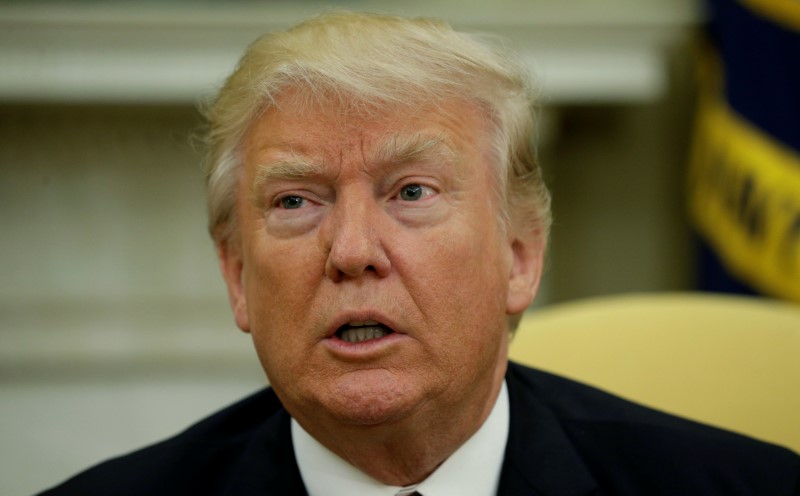WASHINGTON (Reuters) - U.S. President Donald Trump has responded to the new South Korean president's advocacy of talks with North Korea by saying he does not oppose discussions, but reiterated that the circumstances must be right, according to a transcript of an NBC interview.
Moon Jae-in's advocacy of engagement with North Korea has appeared to contrast with the approach of the United States, South Korea's main ally, which has been seeking to step up pressure on Pyongyang over its nuclear and missile programs through further isolation and sanctions.
Asked in an interview with NBC News conducted on Thursday whether Moon's approach would mean a change in U.S. strategy, Trump replied: "He's more open to discussion. I don't mind discussion, but it's under certain circumstances."
"I could probably give you a much better answer to that in a month or two months. We're going to see what happens," Trump added, according to a transcript released on Friday.
"The North Korean situation is a very, very dangerous one for South Korea, for Japan, frankly for China and for the rest of the world. And I think we've handled it very well, very firmly."
Tension has been high for months on the Korean peninsula over North Korea's nuclear and missile development and due to fears it will conduct a sixth nuclear test and more ballistic missile launches in defiance of U.N. Security Council resolutions.
North Korea has been working to develop a nuclear-tipped missile capable of reaching the United States, presenting Trump with perhaps his most pressing security issue. On Thursday, U.S. Director of National Intelligence Dan Coats said North Korea posed "a very significant, potentially existential threat to the United States that has to be addressed."
Trump, who spoke with Moon on Wednesday, this month opened the door to meeting North Korea's Kim Jong Un, saying he would be "honoured" to meet Kim - but only under the right circumstances. U.S. officials have said they see no value in resuming international talks with North Korea until Pyongyang has made clear it is committed to denuclearisation.
A U.S. State Department spokeswoman said on Thursday Washington remained open to talks with North Korea, but needed to see that it would "cease all its illegal activities and aggressive behaviour in the region."
Moon, who was elected this week, has taken a more conciliatory line than his conservative predecessors and has said he would be prepared to go to Pyongyang "if the conditions are right."
He told Chinese President Xi Jinping on Thursday the resolution of the North Korea issue "must be comprehensive and sequential, with pressure and sanctions used in parallel with negotiations."
On Friday, Russia's President Vladimir Putin told Moon in a phone call he was ready to play a "constructive role" in resolving North Korea's nuclear threat, South Korea's presidential office said.

"I, too, aim to find a way to begin talks quickly between North and South Korea as well as the six-party talks," Moon said, referring to talks aimed at denuclearising North Korea involving the United States, China, Japan, Russia and the two Koreas. Those talks collapsed in 2008.